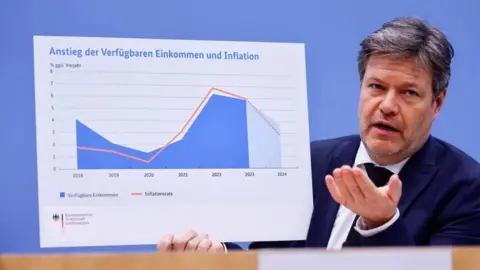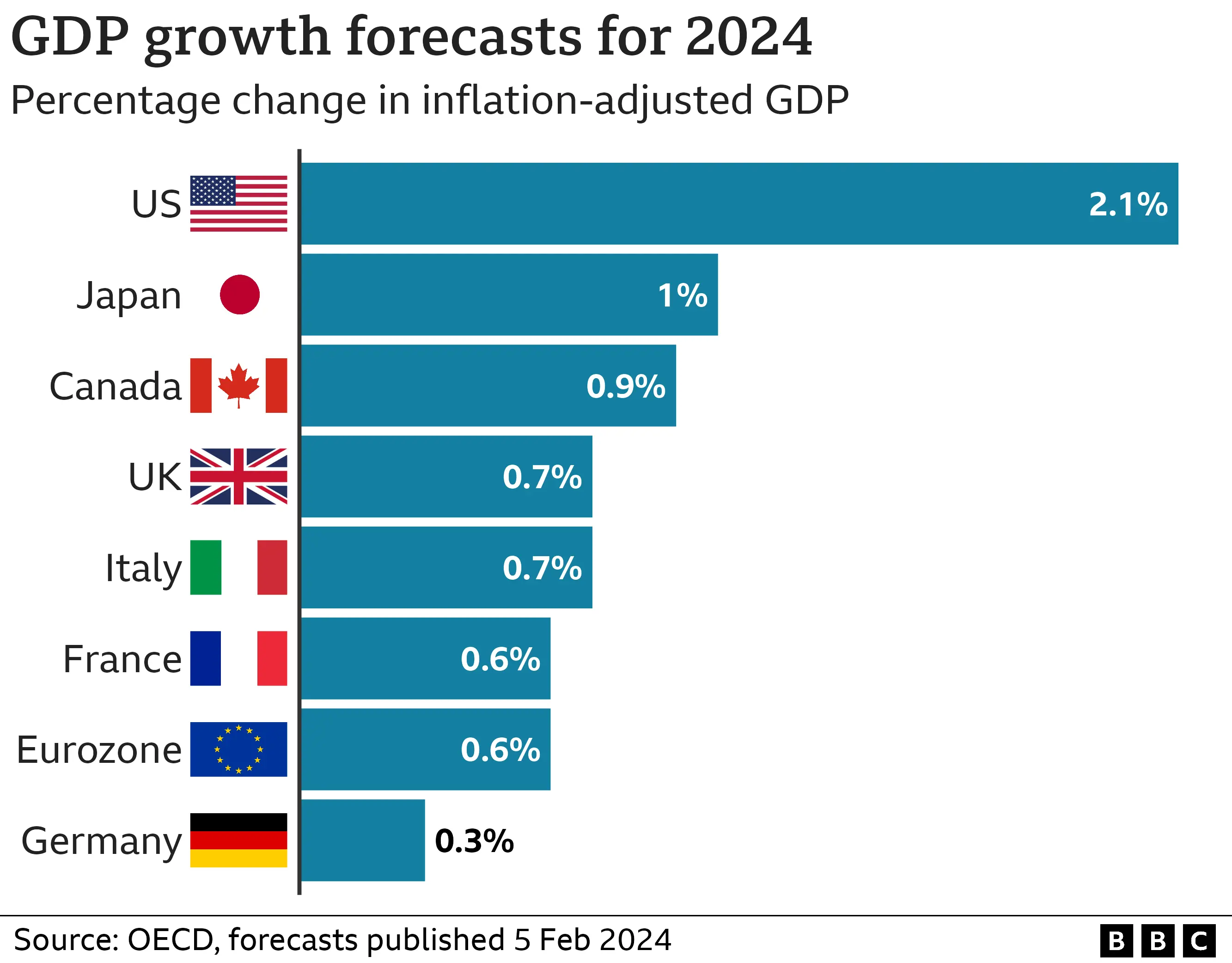v
德国经济根基不稳,希望之光微乎其微
https://www.cnbc.com/2024/02/12/germanys-economy-is-on-shaky-ground-and-there-are-few-signs-of-hope.html
作者:索菲·基德林 2024 年 2 月 12 日
关键点
德国经济一直举步维艰,最新数据显示改善的希望渺茫。
经济学家表示,最糟糕的时期可能很快就会过去,但仍对 2024 年经济增长不抱希望,并暗示该国今年可能进入技术性衰退。
不利因素包括全球贸易放缓、能源价格上涨以及国内和国际政治不确定性。

联邦总理奥拉夫·肖尔茨(社民党,右左)、联邦经济事务和气候保护部长罗伯特·哈贝克(90 联盟/绿党)和联邦财政部长克里斯蒂安·林德纳(自民党)关注预算开始时的辩论 星期。
德国经济的好消息很少。 而最新的经济数据并没有太大改变这一点。
上周公布了 2023 年的几个关键数据,即工厂订单、出口和工业生产,这些数据表明年底经济疲软,德国成为“欧洲病夫”的质疑再次浮出水面。
贝伦贝格银行首席经济学家霍尔格·施米丁对 CNBC 表示:“数据证实,德国工业仍处于衰退之中。”
12月份工业生产环比下降1.6%,2023年总体比上年下降1.5%。 作为德国经济主要基石的出口,12 月份下降了 4.6%,全年下降了 1.4%,即 1.562 万亿欧元(1.68 万亿美元)。
与此同时,工厂订单数据乍一看似乎很有希望,12 月份与 11 月份相比增长了 8.9%。
但凯投宏观(Capital Economics)高级欧洲经济学家弗兰齐斯卡·帕尔马斯(Franziska Palmas)向CNBC表示,这种增长“并不能让人感到太安慰”,并解释说,这要归功于几笔大规模订单,而这些订单往往会波动。 她补充说:“不包括大规模订单的订单实际上已降至大流行后的低点。”
2023 年总体而言,工厂订单较上年下降 5.9%。
Schmieding 表示,虽然 12 月份的“硬”数据尚未表明复苏即将到来,但最新的采购经理人指数报告表明,制造业最糟糕的时期可能很快就会过去。
视频1:4301:43
BDR Thermaa:大多数德国家庭需要从石油和天然气转向可再生能源
欧洲尖叫盒
他指出:“尽管 45.5 仍低于 50 的增长与收缩分界线,但它已小幅升至 11 个月高点。”
荷兰合作银行全球经济和市场宏观策略师埃里克-扬·范哈恩 (Erik-Jan van Harn) 向 CNBC 表示,即便如此,经济增长也不太可能很快实现。
他解释说:“我们的德国工业活动仍远未达到大流行前的水平。” van Harn 表示:“我们仍然预计第一季度将出现小幅收缩,但可能不会像第四季度 23 季度那么严重。” 他预计增长将略有回升,但预计全年增长将持平。
其他人则对德国经济更加悲观。
德国商业银行首席经济学家 Jörg Krämer 对 CNBC 表示:“我们坚持预测,2024 年德国经济整体将萎缩 0.3%。”
根据联邦统计局上个月发布的数据,这与德国经济 2023 年的表现大致一致,当时德国经济同比收缩 0.3%。 数据还显示,第四季度国内生产总值下降0.3%,但德国仍成功避免了技术性衰退,其特点是连续两个季度负增长。
这是因为统计局发现 2023 年第三季度出现停滞而非收缩。 但如果2024年前三个月经济如预期萎缩,德国确实会陷入衰退。
克雷默在谈到经济衰退的原因时解释道:“企业有太多的事情需要消化——全球加息、能源价格高涨、中国的顺风车减少以及德国作为商业地点的侵蚀。”
荷兰合作银行的范哈恩指出,其中一些不利因素也可能在出口数据疲软方面发挥关键作用。 他表示,俄罗斯廉价能源、中国强劲需求以及全球贸易激增等因素数十年来一直提振德国出口,“但现在正在衰退”。
专家表示,除了纯粹的经济之外,国内和国际政治也可能对该国经济构成风险。
德国着眼于 2024 年预算
欧洲尖叫盒
德国宪法法院裁定,将疫情期间未使用的债务重新分配到当前预算计划是非法的,德国联合政府在经历预算危机后一直面临压力。
这给联盟的预算计划留下了 600 亿欧元的缺口,
尽管资金是在未来几年分配的,但危机可能会在年底 2025 年预算规划开始时再次出现。
选民对政府的满意度也很低,反对党基民盟目前在民意调查中领先,紧随其后的是德国极右翼政党选择党。 然而,最近几周,由于针对极右翼的抗议活动席卷全国,数十万德国人走上街头,对后者的支持有所下降。
施米丁表示,在其他地方,美国大选也可能让事情变得更加困难。
他表示:“特朗普的贸易战威胁可能对德国产生重大负面影响。”不过,他指出,这当然取决于选举结果,而且可能要到 2025 年才会全面展开。
德国经济部陷入“困境”
https://www.bbc.com/news/world-europe-68361717
作者:Jessica Parker 和 Damien McGuinness,BBC 新闻,柏林,2024 年 2 月 21 日
EPA 罗伯特·哈贝克 (Robert Habeck) 与显示通货膨胀和收入的图表
Robert Habeck)德国绿党政治家、作家,任德国副总理、联邦经济事务部长。罗伯特·哈贝克此前曾警告称,德国的经济形势“非常糟糕”, 德国经济正处于“混乱的水域”。
罗伯特·哈贝克表示,德国政府对2024年经济增长的预测已从1.3%下调至0.2%。
这意味着欧洲最大的经济体实际上已经陷入停滞——尽管它避免了进入全面衰退。
哈贝克此前称德国的经济形势“非常糟糕”。
今天,他表示,普京全面入侵乌克兰后,德国受到了“非常具体的情况”的打击,因为德国的能源密集型产业依赖俄罗斯天然气。
他表示,德国对出口的依赖使其特别容易受到全球贸易格局变化的影响,而德国经济更广泛的结构性问题是缺乏工人。 哈贝克表示,如果没有移民工人,德国经济就会崩溃。
两年前俄罗斯全面入侵乌克兰后,能源成本飙升。 这引发了通货膨胀,意味着家庭感到受到挤压。
德国央行德国央行警告称,该国实际上可能已经陷入衰退。
德国经济在 2023 年小幅萎缩,当年第四季度萎缩 0.3%。
德国央行在月度报告中表示,“压力因素”可能仍然存在,因此经济产出可能“在 2024 年第一季度再次小幅下降”。
连续两个季度出现负增长将使德国陷入所谓的技术性衰退。
2024 年 GDP 增长预测
鉴于德国经济预计 2024 年将小幅增长,经济学家并不是在谈论全面衰退。
目前通胀率正在下降,失业率仍然很低,能源成本也有所下降,这意味着经济学家预计今年经济将逐步复苏。 尽管预测悲观,德国还是成功地摆脱了俄罗斯天然气的依赖。 经过多年的停滞后,许多行业的工资正在上涨,这应该会提振消费者需求。
但企业界对此持悲观态度。
安德烈·卡西米尔拥有一家建筑公司,他表示政府没有帮助像他这样的企业
Kasimir Bauunternehmung 建筑公司的所有者安德烈·卡西米尔 (André Kasimir) 声称,德国正在成为“欧洲病夫”。
业内人士表示,高利率、熟练劳动力短缺以及该国著名的官僚主义使该行业陷入危机。 2023 年,建筑行业的破产率上升了 20% 以上。
老板们表示,尽管柏林等城市住房严重短缺,但建造新房已经“几乎不可能”。
建设项目需要很长时间才能获得批准,而卡西米尔先生还认为供暖和噪音法规成本太高。
“政府不知道该怎么做才能让我们的建设和生活变得更容易,”他说。
商界领袖表示,该国的许多经济困境都是由政治内斗造成的。 政客们正在就政府刺激经济的新法律争论不休。 哈贝克先生起草了一项立法,旨在削减官僚主义,并为德国企业提供数十亿欧元的税收减免。
该法律已在德国议会下议院联邦议院获得通过,但遭到上议院反对派保守派的阻挠。
德国总理奥拉夫·肖尔茨(Olaf Scholz)好争论的三路执政联盟内部的争吵也激怒了选民,这意味着政府的民调支持率创历史新低。 当宪法法院裁定政府预算非法时,最初的计划以挥霍开支来掩盖政策分歧,但这一计划被泡汤了。
学生埃尔梅迪纳表示,她对德国目前所提供的东西“不太满意”
政府领导人对于解决方案持有不同的看法。 经济部长罗伯特·哈贝克领导的绿党希望修改宪法债务规则,以允许更多的基础设施支出。 掌管财政部的自由派将低债务视为神圣不可侵犯,并正在推动严厉的紧缩措施。
基尔世界经济研究所的斯特凡·库斯教授表示,联盟内部明显的分歧造成了很多“不确定性”。
在德国首都的街道上不难发现对政治阶层的深深不满。
“我们有点睡着了,尤其是在安格拉·默克尔(Angela Merkel)政府的领导下,”柏林居民凯瑟琳(Cathrin)说。 “所以我认为我们必须赶上像中国这样的大型经济体。”
建筑系学生埃尔梅迪纳来自科索沃,但由于缺乏良好的工作机会而感到沮丧,她质疑她是否可以
Germany's economy is on shaky ground and glimmers of hope are few and far between
Key Points
- Germany's economy has been struggling and the latest data has provided little hope for improvement.
- Economists say the worst may soon be over, but are still not hopeful about economic growth in 2024 and suggest the country may enter a technical recession this year.
- Headwinds include a slowdown of global trade, higher energy prices, and national and international political uncertainty.
Federal Chancellor Olaf Scholz (SPD, r-l), Robert Habeck (Alliance 90/The Greens), Federal Minister for Economic Affairs and Climate Protection, and Christian Lindner (FDP), Federal Minister of Finance, follow the debate at the start of the budget week.
Michael Kappeler | Picture Alliance | Getty Images
Good news has been sparse for the German economy. And the latest economic data has not done much to change this.
A few key 2023 data points, namely factory orders, exports and industrial production, were out last week and indicated a weak end to the year that saw questions about Germany being the "sick man of Europe" resurface.
"The data confirm that German industry is still in recession," Holger Schmieding, chief economist at Berenberg Bank, told CNBC.
Industrial production declined by 1.6% in December on a monthly basis, and was down 1.5% in 2023 overall compared to the previous year. Exports – which are a major cornerstone of the German economy – fell by 4.6% in December and 1.4%, or 1.562 trillion euros ($1.68 trillion), across the year.
Meanwhile, factory orders data seemed promising at first glance as it reflected an 8.9% increase in December compared to November.
But this growth "is not much reason for comfort," Franziska Palmas, senior Europe economist at Capital Economics told CNBC, explaining that it is thanks to several large-scale orders, which tend to be volatile. "Orders excluding large-scale orders actually fell to a post-pandemic low," she added.
For 2023 overall in comparison to the previous year, factory orders were down 5.9%.
While this "hard" data from December does not yet suggest recovery is in sight, the most recent Purchasing Managers' Index report indicates that the worst may be over soon in the manufacturing sector, Schmieding said.
VIDEO1:4301:43
BDR Thermea: Majority of German homes need to switch from oil and gas to renewables
"Although at 45.5 still below the 50 line that divides growth from contraction, it edged up to an 11-month high," he noted.
Even so, economic growth is unlikely to be imminent, Erik-Jan van Harn, a macro strategist for global economics and markets at Rabobank, told CNBC.
"We are still nowhere near the kind of activity in the German industry that we saw pre-pandemic," he explained. "We still expect a modest contraction in Q1, but it's likely to be less severe than 23Q4," van Harn said. He is then anticipating growth to pick up slightly, but sees full-year growth as being flat.
Others are even more pessimistic about the German economy.
"We stick to our forecast that the German economy will shrink by 0.3% in 2024 as a whole," Commerzbank Chief Economist Jörg Krämer told CNBC.
This would be broadly in line with how Germany's economy fared in 2023, when it contracted by 0.3% year-on-year, according to data released by the federal statistics office last month. The data also showed a 0.3% decline of the gross domestic product in the fourth quarter, but Germany still managed to avoid a technical recession, which is characterized by two consecutive quarters of negative growth.
This is due to the statistics office finding that the third quarter of 2023 saw stagnation rather than contraction. But should the economy contract as expected in the first three months of 2024, Germany would indeed fall into a recession.
"Companies simply have too much to digest — global rate hikes, high energy prices, less tailwind from China and an erosion of Germany as a business location," Krämer explained, addressing reasons for the downturn.
Some of these headwinds may also play a key role when it comes to weakening export figures, Rabobank's van Harn pointed out. Factors like cheap energy from Russia, strong demand from China and surging global trade buoyed Germany's exports for decades, "but are now faltering," he said.
Looking beyond the purely economical, national and international politics could also be a risk for the country's economy, the experts say.
Germany sets sights on 2024 budget
Germany's coalition government has been under pressure after going through a budget crisis following a decision from the constitutional court that the re-allocation of unused debt taken on during the pandemic to current budget plans is unlawful.
This left a 60-billion-euro hole in the coalition's budget plans, and as the funds were allocated for years to come, the crisis is likely to rear its head again at the end of the year when 2025 budget planning begins.
Voter satisfaction with the government is also low, with the opposition CDU party currently leading in the polls and being followed in second place by Germany's far-right party, the AfD. Support for the latter has however declined in recent weeks amid protests against the far-right sweeping the country, with hundreds of thousands of Germans taking to the streets.
Elsewhere, the U.S. election could make things more difficult as well, Schmieding suggested.
"Trade war threats by Trump could be a significant negative for Germany," he said – however this of course depends on the outcome of the election, and may not unfold in full force until 2025, he noted.
German economy is in 'troubled waters' - ministry
https://www.bbc.com/news/world-europe-68361717
By Jessica Parker & Damien McGuinness,BBC News, Berlin 21 February 2024

The German economy is in "troubled waters," according to country's economy minister.
Robert Habeck said the German government's forecast for economic growth for 2024 had been revised down from 1.3% to 0.2%.
This means that Europe's largest economy has effectively stalled - although it has avoided entering a full-blown recession.
Mr Habeck previously called Germany's economic situation "dramatically bad".
Today, he said that Germany had been hit by a "very specific situation" after Putin's full invasion of Ukraine because its energy-intensive industries were dependent on Russian gas.
Germany's reliance on exports made it particularly vulnerable to changes in global trade patterns, he said, and the broader structural problem for the German economy was its lack of workers. Without migrant workers Germany's economy would collapse, Mr Habeck said.
Energy costs soared after Russia's full invasion of Ukraine two years ago. This sparked inflation, meaning that households are feeling squeezed.
The country may in fact have already slid into recession, according to a warning by Germany's central bank, the Bundesbank.
The German economy shrank marginally in 2023 and contracted by 0.3% in the fourth quarter of that year.
In its monthly report the Bundesbank said "stress factors" would probably remain and that economic output could therefore "decline again slightly in the first quarter of 2024".
Two negative quarters in a row would put Germany into a so-called technical recession.

Given that the German economy is predicted to grow slightly in 2024, economists are not talking of a full-blown recession.
Inflation rates are now falling, unemployment remains low and energy costs have come down, meaning that economists expect the economy will gradually recover this year. ??Despite gloomy predictions, Germany managed to successfully pivot away from Russian gas without the lights going out. After years of stagnation, wages in many sectors are rising, which should boost consumer demand.
But businesses are pessimistic.

Germany is on its way to being the "sick man of Europe", claims André Kasimir, who owns building firm Kasimir Bauunternehmung.
High interest rates, skilled labour shortages and the country's famed bureaucracy have, say industry figures, plunged the sector into crisis. In 2023 insolvencies in the construction sector rose more than 20%.
Bosses say building new homes has become "practically impossible", despite a desperate housing shortage in cities like Berlin.
Construction projects take far too long to get approved while Mr Kasimir also views heating and noise regulations as too costly.
"The government does not have a clue what to do to make it easier for us to build and to live," he said.
Business leaders say that many of the country's economic woes are caused by political in-fighting. ??Politicians are squabbling over the government's new law to stimulate the economy. Mr Habeck has drafted legislation which should cut bureaucracy and give German businesses billions of euros of tax breaks.
The law has been passed in German parliament's lower house, the Bundestag, but is being blocked by opposition conservatives in the upper house.
Squabbling within Chancellor Olaf Scholz's argumentative three-way governing coalition has also irritated voters, meaning that the government's poll ratings are at a record low. Initial plans to paper over policy differences with lavish spending were blown up when the constitutional court ruled the government's budget illegal.
Government leaders have opposing views on what the solution is. ??Economy Minister Robert Habeck's Green Party wants to amend constitutional debt rules to allow more spending on infrastructure. The liberals, who run the finance ministry, view low debt as sacrosanct and are pushing for tough austerity measures.
The obvious divisions within the coalition are creating a lot of "uncertainty", says Professor Stefan Kooths from the Kiel Institute for the World Economy.
Deep unhappiness with the political class isn't hard to find on the streets of Germany's capital.
"We fell, especially under the government of Angela Merkel, a bit asleep," says Berlin resident Cathrin. "So I think we have to catch up against the big economies like China."
Architecture student Elmedina is from Kosovo but, dismayed by a lack of good job opportunities, she's questioning whether her future does now lie in Germany.
"I had an idea that I would be able to live a better life… but I'm not so satisfied with what Germany has to offer right now."